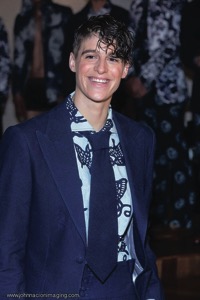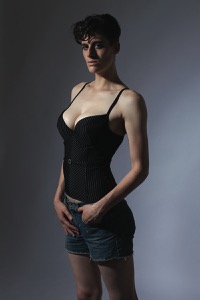
Two points. One, Rain Dove is literary. By that, I mean she presents her point-of-view in a way that is both shockingly precise and emotionally compelling. It is clearly the work of both a voracious reader and natural writer, I’m guessing. When asked, for example, for practical advice in the fashion industry, where she has commandeered attention for her astute performances in Beau Lawrence’s Ace Revington menswear campaign and the Play Out campaign featuring women with bilateral mastectomies who have bypassed reconstruction. “Treat yourself like a company. Not a product.” That isn’t just some squishy universal modeling maxim. Nothing touchy-feely like: “Win on the inside first!” on posters of smiling mountain climbers with remarkably white teeth given the elements. It’s sensible and, Dove goes on to explain in terms even a household pet could understand, “Most models are not successful long-term because they spend their careers relying on other people to discover them or to sell them. They rely on their agency to brand them and set a price on their time worth. The most famous models and successful ones don’t do this. They run themselves as a business.”
And then Dove goes a step further and focuses on one subject she feels passionately about: Self-worth.
Which shouldn’t be entirely shocking given she’s managed to get noticed in fashion for her androgynous look, byproduct of genetic randomness, and as a model equally at home in both women’s and men’s clothing, tempting both male and female and everything in between audiences. And that doesn’t come along every day, now does it?

Second point. Dove doesn’t come across as deeply introspective. A doer, not a thinker. I asked her about the time in Colorado when she was on a wildlife fire prevention crew, the result of interest, timing and her unique ability to pull off being a man in a male-dominated field. “There was just this perception that women couldn’t ‘step to it’ as much as the guys. I went under a pseudonym and nobody even asked if I were trans[gender] or gay; they just thought I was a guy. I lived a year like that,” she boasted to Buzzfeed. But when asked if her emotional needs were being met in Colorado or whether she dated or was dating, she remarked with characteristic pluck, “My emotional needs are met by my own validation. I learned a long time ago not to rely on others to make me feel attractive, confident or capable.” Dove goes on. “I have been a very careful dater all throughout my young adult life. Even when dating openly, communication and the ability to still pursue my individuality is important to me.”
Her story, one that is still very much being written, routinely comes down to several seminal stories like the one above.
Once, on a bet, and with a healthy dose of sororal goading from a good friend, she decided to go to a modeling audition after her Cleveland Browns lost. When she arrived, she found out two things. They wanted her to come back the next day (maybe they only wanted blond-haired women?) and the next day, when she entered and saw not a room full of brunette women but men only, she had another Aha moment: Gender capitalism.

For Dove, gender capitalism is this notion that, “The beauty of clothing is the engineering which is meant to highlight and celebrate all body types regardless of gender. What I really wish is that the advertising of these garments were more sex-nonconforming. I wish that through the promotion of commercial goods that are commonly purchased at stores like H&M and The Gap, all human sexes felt that the clothing was accessible for purchase without social stigma.” And by agreeing to model men’s clothes, she takes gender capitalism to its natural conclusion by not only promoting a designer’s wares but by showing how it is possible to carry it off.
So, is there another level of exploitation that comes with a new genderless generation of potential supermodels? For Dove, there is. “I think it’s part of the game for any model to be exploited. And at times people will hire me as a ‘novelty’ to show how diverse or ‘open-minded’ their brand is. This is not necessarily a bad thing. Any movement toward displaying acceptance of different types of people is great and should be encouraged. The issue is when I’m presented in a way that makes me seem like a gimmick, because for some it may be ‘odd’ or ‘unique’ to have someone like me in their clothing. But for me, as a person, it isn’t odd at all. It’s not an inspiring or strange thing that I wear briefs and tuxes. It’s not bizarre that I enjoy lacey lingerie or pleated skirts. This eclectic nature is all day every day for me. It’s not a trend and it’s not likely to change.”
I mentioned there were a few well-documented stories about her life and her relationships with her family, though somewhat known, is always a subject Dove can return to with characteristic honesty and intelligence: “My father has a special relationship with me that involves very little communication. When I came out, I was ready and resolved about it. I was at peace enough to put my relationships with my family members on the line in exchange for integrity. However I had been able to go through a 21 year process at the time. I got to mourn my expected identity, question myself, explore, celebrate, cry, get angry and feel that feeling of It-is-OK-ness. However, my family hasn’t had that same amount of time with the information I’ve had. My parents come from another generation. My father, a tough human to crack, was technically just another kid like me; just as vulnerable and just as needy for the processing of things. I think we all tend to expect our parents to just accept us immediately because they have to. We’re they’re kids, after all. But I think things like the [emotional] rollercoaster my father is displaying is not wrong or unhealthy. It’s what some people need to digest things. I had my time to process. The least I could do is give them theirs.”

If Rain Dove seems wise beyond her tender years, it’s because she is. Being a pioneer in anything – including gender-nonconforming modeling in the world of high fashion takes smarts, instinct and a healthy dose of confidence. But the one question that up-and-coming icons never seem to tire of asking is this: Who gets to play you in the story of your life? Suddenly an unexpectedly childlike Rain Dove comes out. “Epic question! The story of my life of course must be played by Justin Bieber with dark hair and breast implants. Or Meryl Streep. (Who can technically be anyone at any time.) Or Hugh Jackman with a manicure and breast implants. Orrrr, some previously undiscovered actor who ‘just needs that big break.’”
Expect to see a lot more from Dove as she uses her platform to truly turn the concept of gender on its head. “The goal this year is to work with a brand that is for ‘girls next door types’ to represent ‘a new type of girl next door,’” enthuses Dove in typical style. “I have the breasts for Victoria’s Secret so maybe it could be them. It sounds impossible to most, but if it’s impossible then I want to try to do it. It’s a cop out and easy for a 6’2″, muscular, square jawed, short haired woman to be a male model. But for someone like me to be able to sell a dress on a commercial (aka popular) level? Surprisingly that’s the hard part in both fashion and film. So let’s make it happen!”
Rain Dove: Forever casting a wider net.











